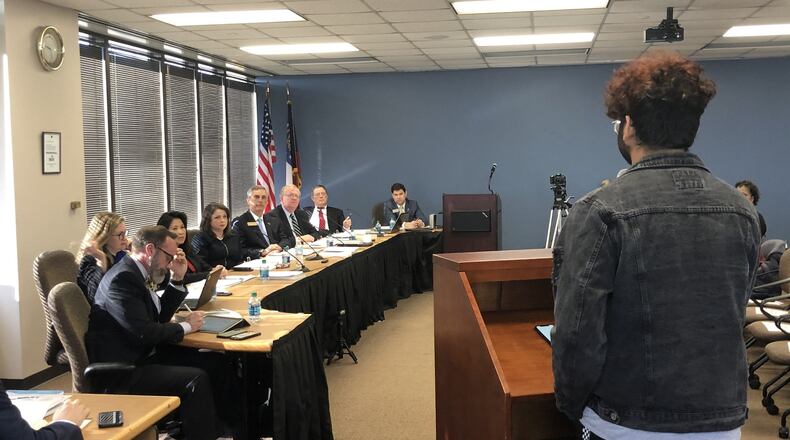The State Election Board voted unanimously Friday to conduct recounts of Georgia’s new paper ballots with scanning machines instead of people.
The board approved an elections rule that requires recounts to rely on bar codes, despite opposition from protesters who lined the walls of the meeting room. The protesters held signs calling for paper ballots filled out by hand instead of Georgia's new hybrid voting system, which combines touchscreens and printed-out paper ballots.
The board’s decision means that until statewide audits of election results begin in November, the readable text on ballots won’t be counted. Votes will be tabulated based on QR codes printed on paper ballots.
Election integrity advocacy groups had argued that recounts by hand were necessary to ensure accuracy of vote counts. A hand count would check whether the printed text that voters see matches the bar codes.
But election officials said computer scans of bar codes are more accurate than hand counts, and audits will help catch errors.
“I have no trouble with recounts being conducted with a scanner, knowing we’ll go back later and look at the human readable text and compare the results as part of an audit,” Bartow County Elections Supervisor Joseph Kirk said during public comments to the board.
The elections board hasn’t yet considered audit procedures. State law requires audits of election results, conducted by manual inspection of random samples of paper ballots, starting in November.
In the meantime, encoded votes will be what’s counted on Election Day and for recounts.
“I cannot read a QR code,” Marissa Hortos, a Georgia State University student from Cherokee County, said during comments to the board. “It’s impossible for a human to comprehend. I will never truly know whether my vote, the vote I intended to cast, will be counted.”
Georgia’s new voting system will be rolled out Monday, when statewide early voting for the presidential primary election begins.
Voters will choose their candidates on touchscreens, which are attached to printers that create paper ballots. Then voters can review their printed ballots before inserting them into scanning machines to be counted.
Unlike Georgia’s previous electronic voting system, recounts on the new voting computers will rescan paper ballots, said Ryan Germany, the general counsel for Georgia secretary of state’s office. Previously, recounts were conducted by retabulating memory cards that contained votes in each touchscreen.
Losing candidates in Georgia are entitled to a recount if they lose by less than 0.5% of total votes cast.
The board also began considering additional changes to recount procedures: Manual hand recounts would be conducted if no scanners are available, or if a judge orders a hand recount. That proposal could receive a vote at the board's next meeting.
The board voted down a different proposal that would have reduced the number of voting computers required in each precinct.
The rule would have allowed election officials to account for early voters when deciding how many voting machines are needed on Election Day. A state law passed last year called for one voting booth for every 250 registered voters in a precinct.
State legislators could change that law.
A bill introduced in the Georgia Senate on Friday would maintain the requirement for one voting booth for every 250 voters in November general elections, but county election directors would have discretion to determine the number of voting computers in other elections.
Where to vote early in metro Atlanta
Atlanta: Early voting for presidential primary, Atlanta's water tax begins Monday
Cobb: Early voting starts March 2 in Cobb for presidential primary
DeKalb: Early voting starts Monday in DeKalb: Here's where to cast your ballot
Fulton: Early voting polls set to open in North Fulton
Gwinnett: How to vote early for the Georgia presidential primary in Gwinnett
About the Author
Keep Reading
The Latest
Featured





